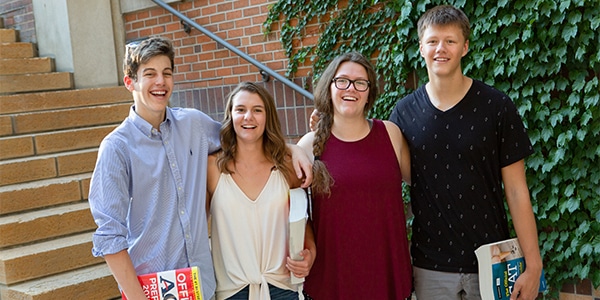Rankings vs. Fit, Part IV
Rankings vs. Fit Part IV
In this series, Audrey dissects a recent debate over the merits of Ivy League Universities which has opened up a much broader and more important conversation – one about choosing colleges and the importance of looking beyond selectivity and rankings when choosing a school. This is Part Four of the series. Here are the other posts: Part I, Part II, Part III.
At the end of Part Three, I suggested there were four “corners,” or major sets of considerations, to assist in narrowing your college list from “all of the schools in the known universe” to “6 or 8 or 10 or however many applications one person can actually complete.” Those corners are Geography, Academics, Extracurriculars, and Amenities.
Geography
You may have been told that you can find your niche anywhere, and to some extent, that’s true. But it will be easier to find opportunities to go cross-country skiing in Minnesota than Louisiana. Do you have strong feelings about trees? Snow? Squirrels? Ragweed? Elevation?
Here are some geography questions to ask yourself: How far from home do you want to be? Do you want to be able to dash home on a weekend with a car full of laundry, or are you happy with Christmas and summer?
What kind of weather do you want to live with for the next four years? Do you really hate cold? Or heat? Or rain?
Do you want to be near the mountains? The ocean? Would you prefer an an urban campus integrated into a large city, or a peaceful retreat with tree lined walks and mossy brick and people playing frisbee on the quad?
Academics
What do you want to be when you grow up?
Do you have a ready answer, or are you now caught in a wave of panic? Either way, you can narrow your list! If you know what you want to do, you have a passion and a focus, it’s important to find a school that has that field. Meet with some professors, or at least send some e-mails. Talk to them about your interests.
If you have no idea what you want to study, you probably want to avoid schools that have a very limited focus or ask that you pick a major immediately. You may want to look for schools that encourage you to explore a few different subjects your first year or two. And even if you have no idea what your future looks like, you should be able to find a major, or two, or three, on the list of the college in question, and think to yourself, “Hm. Maybe.”
How about class size? Picture yourself in a lecture hall with 50 or 100 other students. Then picture yourself in a room with ten students and one professor who knows your name and expects you to have something interesting to say. One of those might sound horrible. Most schools will have some of each the distribution varies pretty widely.
Do you think you might want to go to graduate school? Some schools send a lot more students on to get PhDs than others. What about opportunities for undergraduate research or study abroad programs?
Extracurriculars
What keeps you sane? What keeps you centered? What has been your refuge throughout high school when things were a little overwhelming? Your ideal college should offer some opportunity to do that, whether it’s basketball or saxaphone or religious services of your denomination, either on campus or near by. If art is your hobby, but you don’t want to major in it, would you be able to enroll in studio classes, or are they restricted to studio art majors?
In addition to the hobbies and activities you know are important, what new things do you hope your college will have? Take a look at the list of clubs and activities at a few different colleges and universities – what kinds of clubs are (and aren’t) offered can provide a lot of insight into the culture.
How important is Greek life (or avoiding Greek life) to you? What about sports? The idea of a whole campus decorated in school colors and excited about the next game might seem a necessary part of your college experience, or something you’d rather avoid entirely.
Amenities
It’s not enough to say, “nice dorms.” I loved my dorms. They were historic, with beautiful wood floors and high ceilings and old radiators that knocked and clanked all night in the winter. They had no air conditioners or elevators, but huge closets and plenty of windows. Old buildings are pretty, but they do come with some limitations.
What is “nice” to you? Also, beyond the building itself, think about policies. How do you feel about gender divisions in housing? Is it important to you that you be in a quiet or substance free dorm? What about restrictions on visiting hours, or even curfews?
“Good food” is not obvious, either. Having a choice between eighteen fast food options might sound amazing to you, or it might sound like torture. Do you have dietary restrictions for religious or health reasons? What are the vegetarian options like?
How about the athletic facilities? Art museum? Library? Weird little underground student-run pub?
Some of these things will seem very important to you. Others will seem silly and not worth considering. But by coming up with your own list of must-haves, you can rank colleges for yourself, and (hopefully) end up with a list of schools that fit you, not some obscure list of criteria made up by someone you’ve never met. And since you’re the one actually going to the college in question, it seems like that might be more important.
Audrey Hazzard is a Tutor at Get Smarter Prep.



